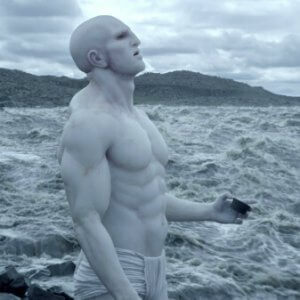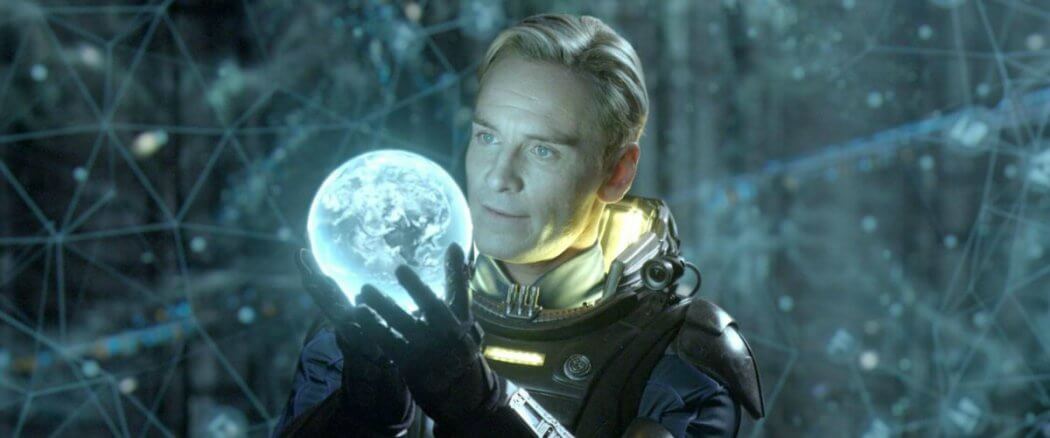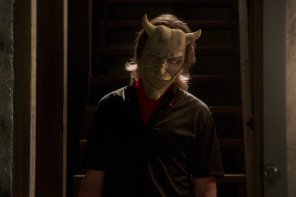This year Ridley Scott has been receiving praise for his direction of The Martian; last year he was the center of Biblical controversy with his adaptation of Exodus: Gods and Kings, but one thing remains constant in his work (whether it be Blade Runner or GI Jane), he is asking serious questions. And not just to challenge one particular group – he is asking all the big questions about existence, politics, religion, and even science.
In 2012 Scott gave us his Alien prequel Prometheus. In it he explores the what-ifs of our existence through one of the current, and most popular, beliefs that life on our planet was “seeded” by an alien race that evolved prior to our own evolution. Why is this important in the Christian community?
The biggest take away from Prometheus is this: Science can answer any question… but not completely, it simply leads to yet another.
Prototypes
First I need to backtrack a bit, and get to the premise: Archeologists in the future have discovered a series of cave drawings that create a map theorized to lead to our alien makers – depending on which DVD version you view you may see an alternate opening sequence in which the humanoid alien does in fact seed life (this will be discussed in detail momentarily). A wealthy, dying businessman puts together an expensive cross-galaxy expedition in which he hires experts in science and engineering to be led by an archaeologist couple. This is all overseen by a creepy android (Michael Fassbender) and the businessman’s heartless daughter (Charlize Theron).
With this being a prequel to Alien, there is a lot of anticipatory and building anxiety… the sense that something evil is behind a door, and mankind is willing to open it to satiate its curiosity.
 In 1949 Joseph Campbell first published The Hero with a Thousand Faces. In it he compiled the prototype of all mythology by comparing stories, myths, and religions of all ages and cultures¹; and Ridley Scott has a history of following these models (Legend is probably the most transparent example). Not only does Prometheus follow the Hero’s Journey per Campbell, but it also fits it into a meta-narrative that may explain our existence (in part).
In 1949 Joseph Campbell first published The Hero with a Thousand Faces. In it he compiled the prototype of all mythology by comparing stories, myths, and religions of all ages and cultures¹; and Ridley Scott has a history of following these models (Legend is probably the most transparent example). Not only does Prometheus follow the Hero’s Journey per Campbell, but it also fits it into a meta-narrative that may explain our existence (in part).
Prometheus was a Greek Titan who molded mankind out of clay. He also stole fire from Mount Olympus and gave it to the humans he had crafted. As punishment he was chained to a stake and an eagle ate his regenerating liver for eternity. As punishment to mankind Zeus sends Pandora (the first woman) and her box of not-so-goodies. If this sounds familiar, that is Joseph Campbell (and Ridley Scott’s) point. It should sound quite a bit like the biblical creation story (please see footnote if you have not already).
Just like the story of Prometheus, the men and women of this expedition are playing with fire, and there will be consequences for all involved.
The Artificial
An actor who deserves more acclaim is Michael Fassbender. I know he’s got the Magneto role and all, but his performance as creepy android David, who reads people’s dreams as they sleep and is working with unknown ulterior motives, is one that will set you on edge and question what constitutes conscious.
In many ways Scott is revisiting the logos that made Blade Runner a mind-bending film. Again, we are left to wonder how artificial David is. Can man really recreate the full spectrum of humanity and place it into a machine that will then develop to become its own unique “person”? And if it does, what will it learn to want? To be? To feel and do? Scott foresees the darkest of potential, and David is inborn with a mimicry that is true to human nature, and yet so distant, almost like a rocket pointed in the wrong direction.
There is also a struggle between the logic of science, industry, and business; and nature, human touch and tenderness; and the violence of nature that leads to life and death. Scott is often juxtaposing earthy images with technological innovation, making certain alien killers resemble reproductive organs to highlight the relation between birth and death. He never gives a clear answer on whether or not the relationship between the man-made and the natural is positive, in conflict, or destructive – there are moments of all these outcomes sprinkled throughout.
Answers (Spoiler Alert)
The long and the short of it is: There are none. At the end of the movie we know maybe two things: 1) the destruction of earth has been stopped by the sacrifice of Janek (Idris Elba) and his crew flying their ship into the alien bioweapon set to destroy what our “creators” wrought, and 2) our heroine, Dr. Elizabeth Shaw (Noomi Rapace) will continue on until she dies or finds the answer to the meaning of her (and all of our) existence.
Probably the most interesting question raised by this is: How far are we willing to go to learn why we are here?
 In Prometheus everyone dies, Dr. Shaw and David hot-wire an alien spacecraft and head off in search of the “creators’” home planet, and the first Alien is created through the biological weapons found on this planet. Not to mention that the entire earth was nearly wiped out by this same dark goo. For Shaw this is not enough, this destruction and loss.
In Prometheus everyone dies, Dr. Shaw and David hot-wire an alien spacecraft and head off in search of the “creators’” home planet, and the first Alien is created through the biological weapons found on this planet. Not to mention that the entire earth was nearly wiped out by this same dark goo. For Shaw this is not enough, this destruction and loss.
This editorial note is not new to sci-fi, it’s been there since the beginning… but so have the atrocities that have led to humanity’s advancement. Consider the ethical limits that are constantly being pushed, from grave robbers during human biology’s great advancements to the development of the nuclear bomb while we pursued a more promising source of energy. Even look at the claims of scientific necessity when Planned Parenthood’s recent scandal was brought to light.
Science has always, and will always, push the boundaries of our societal ethos. Sometimes this is for the greater good; sometimes we need to stop and question its purpose and intent. That is exactly what Scott does – he does not allow the cop out of equating scientific and absolute logic, and that is why this is a valuable frame of reference (as is Frankenstein or the play An Experiment with an Air Pump²).
Closing Thoughts
Does Scott provide a Christian framework in this tale of creation? No, not really. What he does do, however, is challenge the penultimate stance science has come to stand in with contemporary thinkers. We often equate the term “scientific” with irrefutable; but in Prometheus we are forced to realize that science will have its limits, that there are questions that may have help in being answered with science, but that it cannot be ultimately relied on.
When science is ultimately relied on then “all is permitted” (Doevstoesky), and not only are our moral boundaries pushed, but the essence of our humanity becomes warped.
So where do we turn then? Do we bury ourselves in pursuit of answers like Dr. Shaw? Maybe. Maybe that is one path, but where faith leaves off despair creeps in. Faith may be the only thing that holds these pursuits in balance, which prevents them from falling over the edge of despair. I cannot help but think of Tony Scott (Ridley’s brother) and how wrestling with these problems led him to take his own life two months after the theatrical release of this film.
That may be a bit presumptuous. I do not want to imply the film directly correlates to his actions, but the thoughts, the existential quest, and that sense of “deep crying out to deep” (as Hopkins puts it in his poem Nondum) are present in the work he and his brother did.
____________________________________
¹Christianity is included in his analysis as myth. There is not enough time and/or space for me to address something that has been thoroughly addressed by so many Christian apologists – if I were to start somewhere, it would be with the Inklings (Lewis, Tolkein, Charles Williams, et. al.). What is interesting about this, however, is that Prometheus understands this commonality as purposeful and not simply mythological; but these “coincidences” of culture actually point to something common and archetypical because it stems from a truth we do not yet know.
²https://en.wikipedia.org/wiki/An_Experiment_with_an_Air_Pump





